News and Announcements
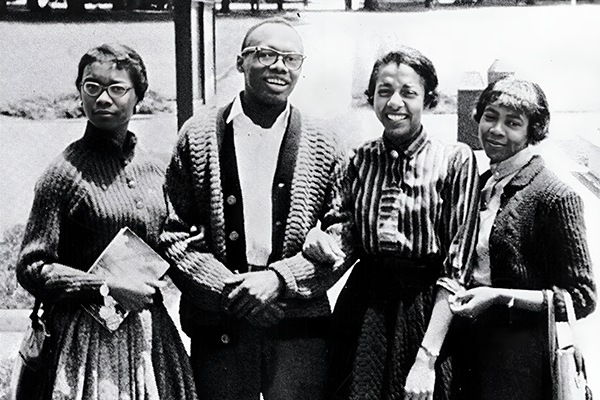
For countless Gator alumni, SF State has provided them with some of their most vivid memories: the crushes, the “aha” moments, the life-changing lectures, labs and professors.
As San Francisco State celebrates its 125th anniversary this year, the University put out a call to alumni to share their greatest memories on campus. We also take a look back at notable quotes by alumni over the years in SF State Magazine and the 1999 Centennial magazine, published for the University’s 100th anniversary.
Willie L. Brown Jr. (B.A., ’55), former mayor of San Francisco
By my sophomore year I was already heavily involved in politicking, getting students elected to student government. Also, I lived in housing that the school rented in Potrero Hill. I paid $14 a month rent, but the food program we had to organize ourselves. We had a treasurer, a secretary, someone responsible for buying the food. We ran our complex.
Laureen Chew (B.A., ’70; M.A., ’72), professor emerita of Asian American Studies
[The Third World Liberation Front student strike of 1968 and 1969] was an impassioned plea for change. It altered my life completely, not just as a student, but as a person. We felt we had to go on strike; we had no other choice.
Linda Yelnick (B.A., ’70), music booking agent
I really had fun attending SF State during the year of the Summer of Love, 1967, and the late ’60s. Now so many years later, I am still and always will be this “flower child” on the inside, and I wish peace and love to everyone. I have always been so honored and proud to have been a student there during its tumultuous late ’60s and now as an alumna. GGF Go Gators Forever :).
Dan Gonzales (B.A., ’74), professor emeritus of Asian American Studies
I don’t know what it is about SF State. [During the strike], there was a harmonic convergence — there were a lot of really interesting people that just happened to coincide on the campus, on both sides, and [the strike] probably wouldn’t have happened at any other time or with a different group of people.
Annette Bening (B.A., ’80), Academy Award-nominated actress
I knew I loved acting, but at San Francisco State, I got the chance to develop that love. I am so grateful for the safe, challenging environment I had in which to educate myself, develop my aspirations and, most importantly, a place where I could practice and learn how to trust and value my own individual creative instincts.
Dan Button (B.S., ’83), high school teacher
In the spring of 1982, I saw a girl walk her bike across campus to the student union. ... I found out she worked at a snack bar in the basement, but I was kind of shy, so I got in line and ordered a bagel just to get the chance to talk to her. ... Finally, I found the nerve to ask her out and, unbelievably, she said yes. Three months later, on a beach in Mexico, I asked Jamie to marry me. We were married two years later. I received more than an outstanding education at State. I also got the woman of my dreams, the mother of my children and my best friend.
Rina Ayuyang (B.A., ’98), comics artist
I lived near campus and would walk down the halls a lot. ... I remember one evening I stumbled upon this one event that was happening in the Creative Arts building. It was a smaller event room. There was this Filipino ensemble playing “Dahil Sayo (Because of You),” which is a Filipino ballad. It was a very film-noir scene actually, this woman singing this Filipino romantic ballad that I just came and found myself in. And it was a very magical experience.
Chinomnso Okorie (B.S., ’17; M.S., ’19), data scientist
[Volunteering at the SFSU Women’s Center], I became so hyperaware of the fact that Black women suffered the most disparities in terms of birth outcomes. I slowly started to fall in love with reproductive health because nobody talks about these things. I was like, “Oh my gosh — I found my niche!”
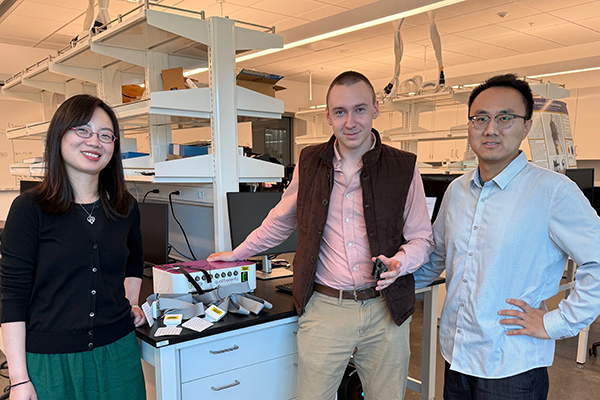
School of Engineering faculty and students have developed the first high-density electromyography (HD-EMG)-based real-time neural-machine interface using the Sony Spresense edge board. This is a milestone for the SOE project Neural2: Efficient Deep Neural Network for Neural-controlled Bionic Arm with Spresense Microcontroller, led by Engineering Assistant Professor Zhuwei Qin and Professor Xiaorong Zhang as part of an ongoing collaboration with Sony’s Sensing Solutions University Program (SSUP).
This groundbreaking innovation integrates deep learning techniques to enable precise hand gesture recognition by processing HD-EMG signals from human subjects’ forearm muscles in real time. The system’s deep learning compression techniques ensure that the neural network models run efficiently on the resource-constrained microcontroller board, offering the potential for real-time movement intent-controlled systems, such as bionic arms and rehabilitation applications. In September, graduate research assistant Peter Chudinov presented the project to Sony’s Japan and Europe teams at the SSUP U.S. end-year review meeting.
In addition to research, the collaboration has led to the Sony Spresense product being integrated into Engineering curriculum, undergraduate capstone projects and outreach activities with community college and high school students participating in research. The Sony collaboration will continue in an expanded project, “Efficient and Robust Deep Learning Models for Neural-Machine Interfaces with Spresense Microcontroller.”
Visit the School of Engineering website to learn more about the project.
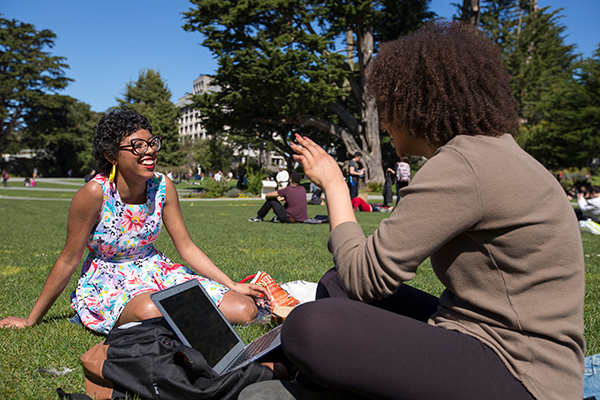
As part of SF State’s commitment to responsible and effective use of generative artificial intelligence (GenAI), Audit and Advisory Services asks that all employees (including staff, faculty and administrators) to review and submit feedback for the SF State Generative AI Guidelines.
These guidelines intend to support general use of GenAI by all SF State employees in their work and other official activities, in order to foster a culture of accountability and quality at SF State. For questions or clarification on any aspect of the updated policy, please email policies@sfsu.edu.
SF State volleyball player Tamiya Wilson posted another great week, helping the Gators pick up two more conference wins, earning the American Volleyball Coaches Association (AVCA) Division II Player of the Week award.
The junior also had six aces and hit .354 on the week. Wilson also won the AVCA Division II Player of the Week award last September.
The Institute for Civic & Community Engagement (ICCE) Awards honor students, faculty, staff and community partners whose leadership, service and collaboration strengthen the bonds of engagement that connects the University and the community.
Submit nominations through Friday, Feb. 14. Please visit ICCE’s Civic & Community Engagement Awards 2025 page for more information and to submit nominations.
The SF State Academic Senate met on Tuesday, Oct. 29, via Zoom.
The Senate:
- Adopted by general consent the following program change to B.A. in Latina/Latino Studies for substantive decrease in units.
- Passed:
- Suspension of Bachelor of Arts in Philosophy and Religion
- Discontinuance of Bachelor of Arts in Earth Sciences
- Revision to S22-298 Academic Integrity Policy
- Resolution to Celebrate 60 Years of CSU Study Abroad
- Revision to S23-306 By-laws for Departments, Equivalent Units and All other Faculty Units that Offer Academic Degrees
- Heard in first reading:
- Resolution in Support of Affirmed Names
- Resolution in Support of Affirmed Pronouns
- Resolution to Prioritize Academic Affairs During Times of Budget Cuts
- Returned items to committee will be presented at next plenary:
- Revision for S13-266 Academic Freedom Policy.
- Revision to S19-230 Grade Appeals Policy
- Heard a presentation from Alex Hwu, associate vice president/dean of the College of Professional and Global Education: “CPaGE Programing and Development.
- Heard a presentation from Andrew Roderick and Tuan Do: “Artificial Intelligence Employee Guideline Campus Review.”
Please view the full agenda, meeting materials and minutes on the Academic Senate website.
The campus community is invited to the presentation “What is Naturopathic Medicine and how to become a naturopathic physician,” Tuesday, Nov. 5, at 4 p.m. in Burk Hall 7.
The presentation is sponsored by the Institute for Holistic Health Studies in the Department of Recreation, Parks and Tourism.
The Center for Equity and Excellence in Teaching and Learning (CEETL) invites the campus community to find rest, joy and community at the “We Wednesday” event on Nov. 6, 3 – 4 p.m. Elif Balin, associate professor of Counseling, will guide participants on how to use expressive movement to promote wellness at work.
CEETL recommends wearing clothes that are comfortable for moving around and bringing a yoga mat or a blanket to lay on, if choosing to participate in the movements that encourage contact with the ground. All movement practice instructions will be adaptable with options following abilities and needs for exploration and expression.
Please RSVP via Qualtrics. Select “WE Wednesday Series” and proceed through the form, then choose “Expressive Movement & Wellness: 11/6 @ 3PM.”
The SFSU Veterans Service Center presents a Veterans Day event on Thursday, Nov. 7, 12:15 p.m. – 2 p.m., by the HSS building and bus stop at 19th and Holloway avenues. The campus community is invited to celebrate the people who have served the U.S. with a flag-raising ceremony. Tabling will follow on the Quad.
The Division of International Education will hold an open house on Thursday, Nov. 7, 3:30 – 5 p.m., in building C of the Village at Centennial Square (next to U.S. Bank). Enter the building and turn left for the office. This is a celebration of the office name change from the Office of International Programs to the Division of International Education.
Thanks to donors to the Philosophy Department and a committee, the Chin-Plaisance Philosophy Colloquia Series presents a talk by University of Massachusetts, Dartmouth, Professor Keota Fields on Friday, Nov. 8, at 3 p.m. in Humanities 587. The talk is titled “Why Read Philosophy by Problematic Philosophers?”
Abstract: “Why should we read Problematic Philosophers — those who defend dehumanizing views of women, people of color, etc.? I reject calls to cherry-pick the ‘good’ bits of a Problematic Philosopher’s work and ‘bracket’ their dehumanizing views. I also reject attempts to synthesize a Problematic Philosopher’s official and dehumanizing views in ways that inadvertently transform him into an intellectual exemplar. Instead, I defend ‘sober’ readings of Problematic Philosophers that acknowledge their work as both important and problematic.”
Please join faculty and staff in a Center for Equity and Excellence in Teaching and Learning (CEETL) discussion circle on Wednesday, Nov. 13, 3:30 – 5 p.m., on Zoom to discuss supporting students with disabilities. Nicole Redding from the Disability Programs and Resource Center will lead this circle.
Please register via Qualtrics. Select “Topical Discussion Circle” and, when prompted by the form, select “November 13th @ 3:30-5. Supporting Students with Disabilities.”
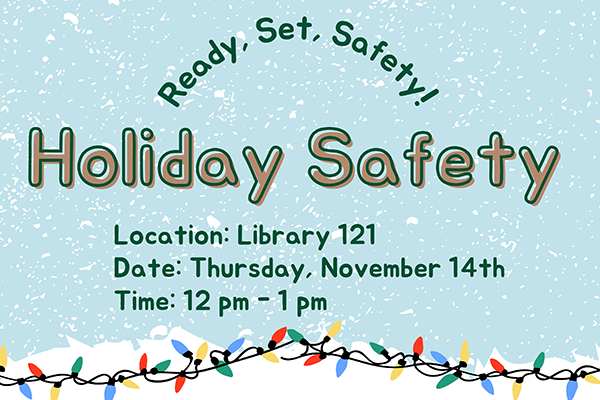
The campus community is invited to a discussion on holiday safety on Thursday, Nov. 14, 11:30 a.m. – 1:30 p.m., in Library 121. Risk and Safety Services hosts the discussion, which will be led by speakers from the Office of Emergency Services and Student Transitions. Snacks and drinks will be provided, but attendees are encouraged to bring their lunch and eat during the presentation.
Risk and Safety Services’ campus talks are collaborative meetings, designed to inform the community of risk mitigation programs in place at SF State.
The All University Committee on International Programs (AUCIP) and the Division of International Education present an international coffee hour on Thursday, Nov. 14, noon – 1 p.m., in the Teaching and Learning Commons (Library 286). The event aims to connect international and internationally minded faculty, administrators and staff about international programs and global issues.
This event occurs twice each semester. AUCIP organizes the event. AUCIP is an Academic Senate committee. The Division of International Education will provide refreshments.
The Center for Equity and Excellence in Teaching and Learning (CEETL) will hold a Justice, Equity, Diversity and Inclusion (JEDI) workshop on Thursday, Nov. 14, noon – 1 p.m., in Library 242. It is titled “Digital Literacy: Pushing Back on Oppressive Citation Cycles through Critical Citation Practices.”
In this interactive workshop led by Senior Assistant Librarians Talía Guzmán-González and Ashley Woodruff, explore and practice essential skills for discovering, evaluating and citing academic works by women; Black, Indigenous and People of Color (BIPOC); and LGBTQIA+ scholars. They’ll dive into the structures in academic publishing that uphold privilege and often marginalize scholars of color and “People of the Global Majority.” The presenters and participants will discuss strategies to break the cycle of exclusion and create more equitable citation practices.
Participants should bring their devices and one or two of their course syllabi. People who attend all three of the workshops in the JEDI series will receive a badge.
Please register via Qualtrics. Select “JEDI Workshop Series” and, when prompted in the form, select “November 14th @ 12-1. Digital Literacy: Pushing Back on Oppressive Citation Cycles through Critical Citation Practices. Library 242.”
SF State Spotlight
Anthropology Professor Peter Biella has received the Society for Visual Anthropology’s Lifetime Achievement Award, granted unanimously by its board of directors.
Biella earned a B.A. and an M.A. in film production from SF State and an M.A. and Ph.D. in Visual Anthropology from Temple University. He teaches in the Anthropology Department and School of Cinema. In the 1970s, Biella developed his interest in visual anthropology, experimental film and anthropological filmmaking by mentoring for three years with John Collier Jr. and with filmmaker Peter Kubelka in San Francisco. After that he studied with Jay Ruby, Richard Chalfen and Peter Rigby in Philadelphia. Between 1984 and 1996, Biella worked as an independent filmmaker while teaching visual anthropology at Temple University. In 1999, after teaching at the University of Southern California, Biella joined the faculty of SFSU to direct the visual anthropology (B.A. and M.A.) program.
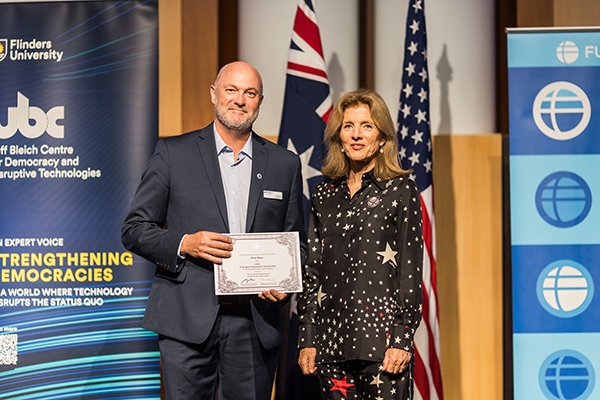
A Fulbright fellow from Australia is working with the SFSU Graduate College of Education to research how the state of California and local unified school districts are responding to challenges in teacher recruitment and retention. Paul Boys is a director of the Gippsland Tech School and Mobile Tech School at TAFE Gippsland, Morwell, Australia.
“Teacher recruitment and retention is a global challenge, which is impacting schools and students across all education sectors,” Boys said. “The opportunity to work with internationally recognized education leaders across San Francisco and the wider Bay Area has given me a unique insight into how the region is collaborating to boost teacher attraction.”
The U.S./Australian Fulbright commission is celebrating its 75th anniversary this year. Please visit the Fulbright Australia website for details and to apply.
Photo courtesy of Paul Boys
In an invited essay for Nature Reviews Genetics, Associate Professor of Biology Pleuni Pennings discusses HIV drug resistance. Nevirapine has been given to HIV-positive pregnant women during labor to mitigate HIV transmission to the baby, however there are concerns that this might increase resistance to subsequent triple-drug treatment for HIV. Pennings discusses how this effect might be temporary. She cites a study that suggests that this resistance might be due to detectable levels of a certain HIV mutation (leading to the resistance to Nevirapine) after treatment, but that the frequency of this mutation among women declines by seven months and continues to decline at 12 months. Data also suggests women taking triple-drug therapy within six months of Nevirapine have higher probability of treatment failure, but the probability was comparable to the placebo group when triple-drug treatment began after six months.
As a population geneticist, Pennings notes these results make sense. The presence of the Nevirapine might create a selection pressure for resistance mutations — increasing its frequency — and when the drug is no longer in the blood, the selection pressure changes so the wild-type virus replicates faster than those with the resistance mutation.